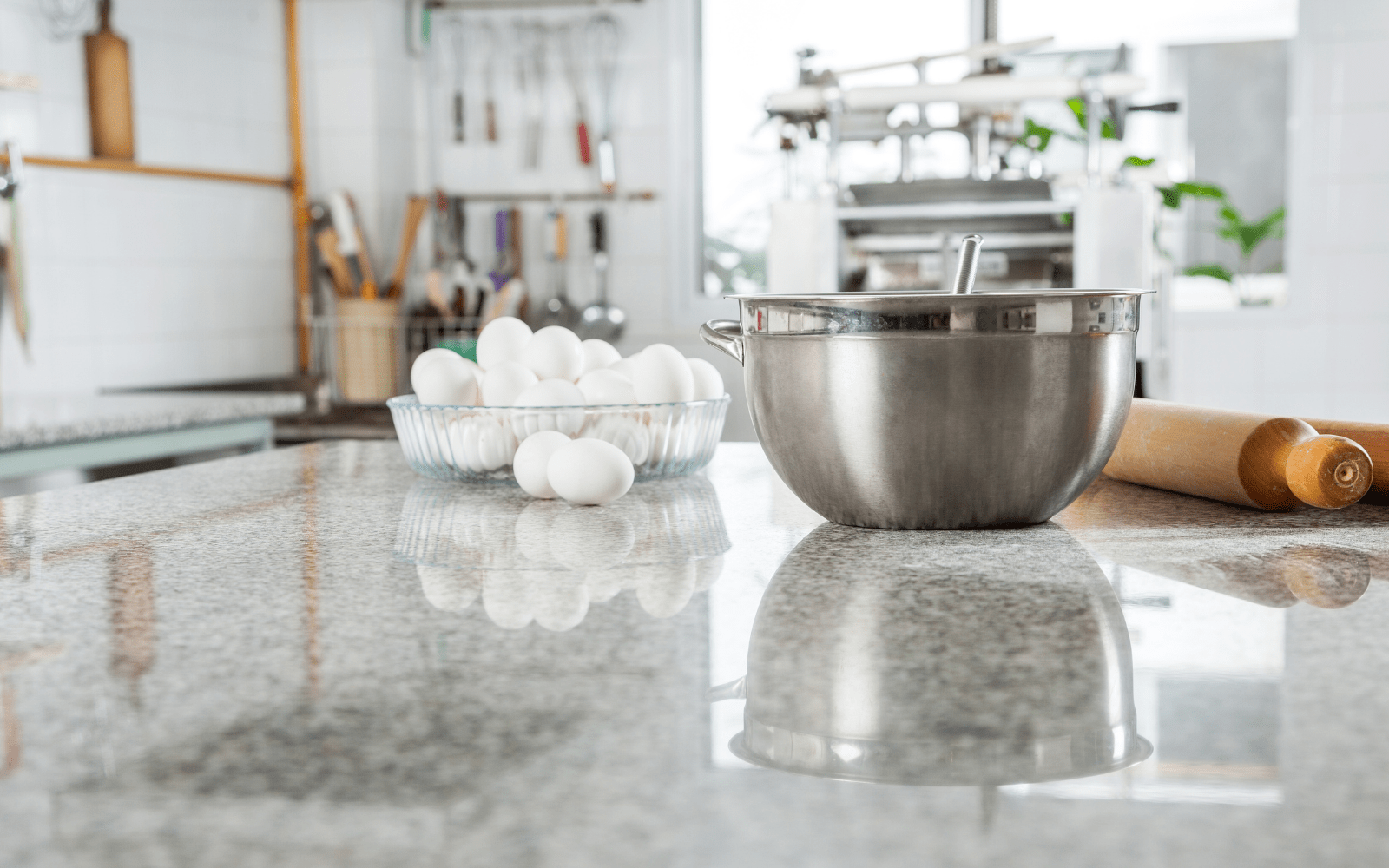If you’re thinking about buying a new kitchen or renovating an existing one, you’ll surely need to get acquainted with countertop materials and how to care for them. In fact, kitchen countertops are one of the most used parts of the kitchen, often working overtime as hobby and homework centers.
That’s why a kitchen countertop must be:
- Resistant
- Easy-to-clean
- Durable
Here’s FILA’s guide to countertop care and maintenance. In this article you’ll find:
- Kitchen countertop materials
- Cleaning and protection instructions for kitchen countertops
Laminate kitchen countertops
Laminate is a commonly-used countertop material: a wood panel is covered with a thin layer of plastic that serves as protection and finish. Laminates provide a good value for the money spent and come a vast variety of classic and modern finishes. In addition, laminates have a good resistance to impact and are generally acid resistant, but do not provide good heat resistance.
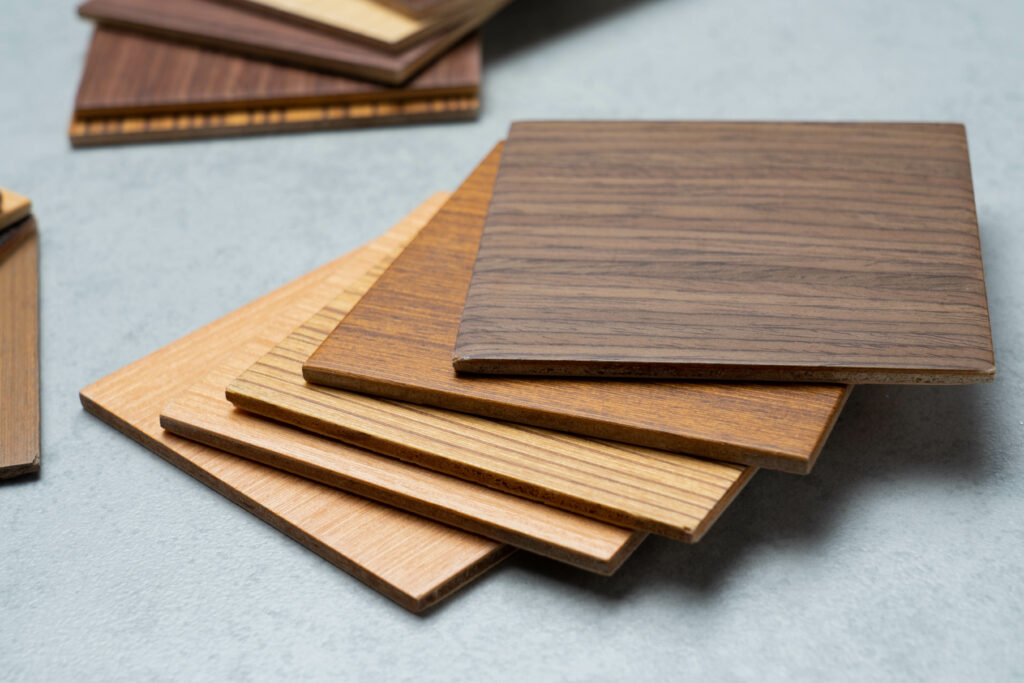
Postformed laminates
Part of the laminate family, what differentiates postformed laminates is that the plastic film wraps around the edge of the wood, taking on a predetermined form or shape. It’s good to know that postformed laminates are sensitive to heat and sensitive to alkaline cleaners (cleaners with a pH of about 8 to 14) or abrasive substances.
💧 Cleaning:
CLEANALL SPRAY Neutral Everyday Cleaner
- The delicate formula does not harm surfaces.
- Low foaming, highly effective.
- Leaves the room smelling fresh and clean.
👉 How to use it:
Spray directly on the surface and wipe with a clean dry cloth. The product dries quickly, no rinsing required.
✨ Protection: not necessary.
HPL (High Pressure Laminates)
Another type of laminate countertop is HPL (high-pressure laniante). This material is obtained by adding layers of thermosetting resin to postformed laminate. This treatment makes the surface oil and heat resistant (up to 180°C / 356ºF) and low absorbent. As in the case of postformed laminates, HPL is acid resistant, but it’s important to avoid using abrasive and alkaline cleaners.
The cleaning recommendations are the same as for other laminate countertops.
💧 Cleaning:
CLEANALL SPRAY Neutral Everyday Cleaner (Instructions above.)
SHOWERCLEAN & SHINE Soap Scum Remover
- Eliminates soap scum, water spots, grime and limescale.
👉 How to use it:
Spray directly on the surface, let sit for a few seconds, then rinse with a damp sponge.
✨ Protection: Not necessary.
Engineered stone kitchen countertops
Engineered stone is produced by combining natural materials into one solid piece by using intense heat and pressure. This easy-to-maintain material resists all chemicals and stains, and it’s available in various sizes and finishes. However, do not use abrasive tools or excessively high heat on engineered stone surfaces.
💧 Cleaning:
CLEANALL SPRAY Neutral Everyday Cleaner (Instructions above.)
SHOWERCLEAN & SHINE Soap Scum Remover, to remove limescale. (Instructions above.)
✨ PROTECTION: Not necessary.
Quartz countertops
Quartz countertops is an umbrella definition that includes all the different types of agglomerates composed of quartz, mineral and resin crystals. Quartz countertops are acid resistant, but it’s not resistant to alkalines present in aggressive degreasers. We also recommend avoiding the use of cream cleaners which can scratch the surface.
💧Cleaning:
CLEANALL SPRAY Neutral Everyday Cleaner (Instructions above.)
SHOWERCLEAN & SHINE Soap Scum Remover, to remove limescale. (Instructions above.)
✨ Protection: Not necessary.
Quartz resin or natural quartz? What’s the difference?
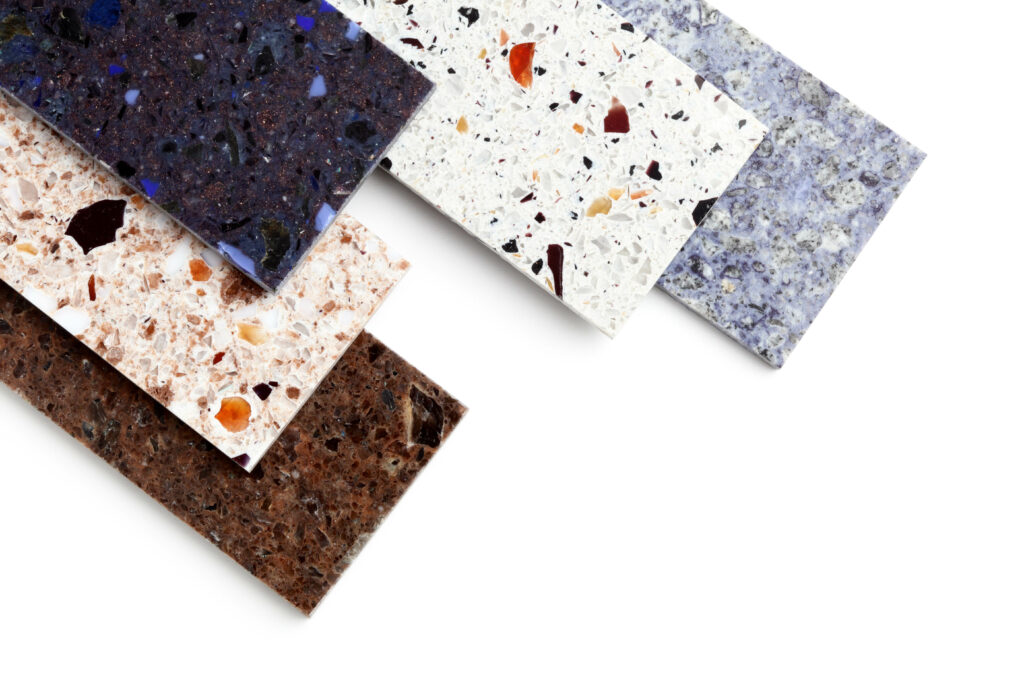
Quartz resin
Quartz resin is a material composed of 94% silica sands and quartz, and the remaining 6% contains polyester structural resins. It’s a nonporous surface highly resistant to coffee, wine, lemon juice, olive oil, vinegar, makeup and many other everyday substances. Quartz resin is not resistant to heat.
💧 Cleaning:
CLEANALL SPRAY Neutral Everyday Cleaner (Instructions above.)
✨ Protection: Not necessary.
Natural quartz
Natural quartz, on the other hand, is a very compact natural stone that is highly resistant to acids and, if unpolished, also resistant to alkaline. Kitchen countertops in natural quartz must be protected.
💧 Cleaning:
CLEANALL SPRAY Neutral Everyday Cleaner (Instructions above.)
✨ Protection:
MP90 ECO PLUS High Performance Penetrating Sealer
- Seals and protects all natural stone, engineered quartz, polished porcelain, grout.
- Does not alter the material’s natural look.
- Makes everyday cleaning easy.
- Eco-friendly: solvent free.
👉 How to use it:
On a clean, dry surface, apply MP90 ECO PLUS with a paintbrush or lambswool applicator, making sure to fully saturate the surface. Let sit for 10 to 15 minutes, then wipe and rub the surface to allow the product to completely penetrate and remove any excess with a dry cloth, lambswool pad or sponge. The surface may be used for normal foot traffic after 4 hours. Full cure and maximum sealer protection is achieved in 8 hours.
Agglomerate kitchen countertops
Marble-resin agglomerate is a material realized with marble chips and resin, and it’s commonly used for kitchen countertops. It’s sensitive to both acids and alkaline substances.
Kitchen countertops can also be realized in concrete marble agglomerates, a material sensitive to acids, but when unpolished resists alkaline substances.
💧 Cleaning:
CLEANALL SPRAY Neutral Everyday Cleaner (Instructions above.)
✨ Protection:
MP90 ECO PLUS High Performance Penetrating Sealer (Instructions above.)
Natural stone kitchen countertops
Marble
Now let’s talk about one of the most precious countertop materials – marble countertops. A critical fact to remember is that marble is sensitive to acids. Polished marble is also sensitive to alkalines, while unpolished marble is not.
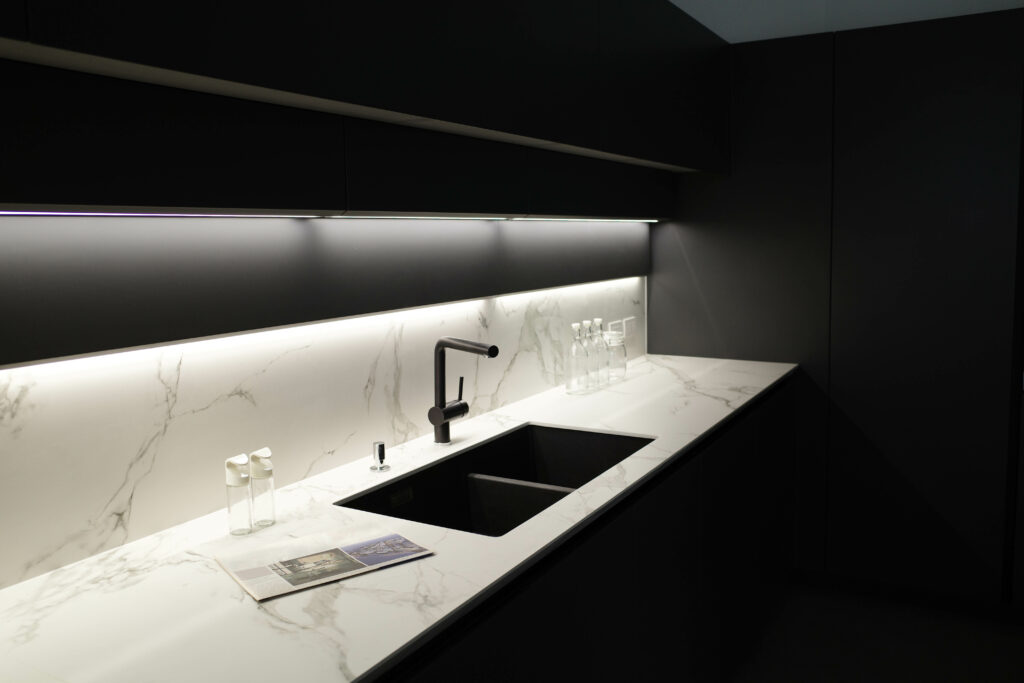
Granite
Now let’s move on to granite countertops. Granite is a harder stone than marble, and resists acid substances. As marble, granite also resists alkaline substances, but only when unpolished. It has low absorbency, so it must be protected from water, oil and stains.
Quartzite
Quartzite is a metamorphic rock composed mainly of quartz. The most colorless, transparent varieties are composed almost exclusively of quartz. Quartzite’s main advantage is that it’s compact and resistant to acid and alkaline agents.
💧 Cleaning:
CLEANALL SPRAY Neutral Everyday Cleaner (Instructions above.)
REFRESH & RESEAL Neutral Cleaner & Resealer
- Cleans natural stone surfaces treated with sealers.
- Renews and extends the existing sealer protection.
- Dual-action: cleans and reinforces surface protection.
👉 How to use it:
Spray REFRESH & RESEAL directly on the surface. Wipe and rub the surface with a soft, dry cloth until completely dry. Do not rinse. Used regularly, REFRESH & RESEAL extends the existing surface sealing protection.
✨ Protection:
MP90 ECO PLUS High Performance Penetrating Sealer (Instructions above.)
To find out more about FILA’s water based sealers, read this article.
Porcelain countertops
Kitchen countertops can also be installed in a common household material such as porcelain tile. Porcelain has many material advantages, one of the most important being that it’s nonabsorbent. Porcelain can be manufactured in an infinite variety of textures, colors and levels of gloss.
Advantages of porcelain tile include:
- Non absorbent
- Variety
- Resistance to acids and alkalines
💧 Cleaning:
CLEANALL SPRAY Neutral Everyday Cleaner (Instructions above.)
SHOWERCLEAN & SHINE Soap Scum Remover, to remove limescale. (Instructions above.)
✨ Protection: Not necessary.
Concrete countertops
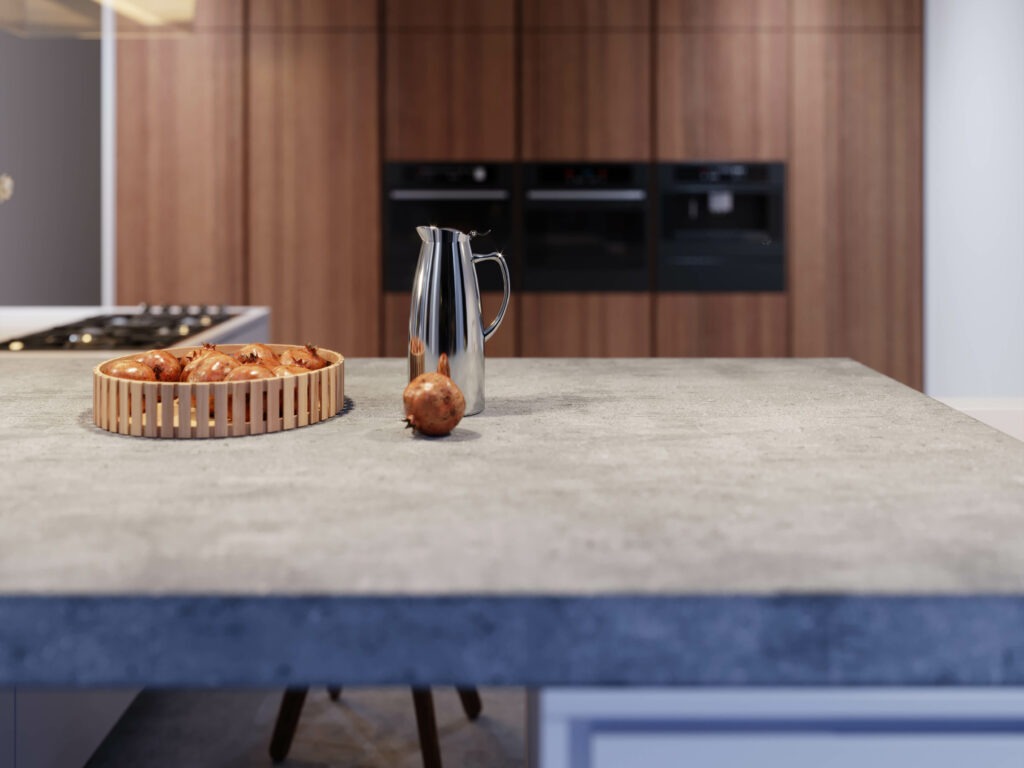
For special design projects, concrete is an contemporary solution. When used as a kitchen countertop, one must be aware that concrete is an absorbent material, therefore easy to stain. When a material is porous, protection is key.
💧 Cleaning:
CLEANALL SPRAY Neutral Everyday Cleaner (Instructions above.)
SHOWERCLEAN & SHINE Soap Scum Remover, to remove limescale. (Instructions above.)
✨ Protection:
👉 How to use it:
On a dry and clean surface, apply an even coat of FOB with a paintbrush, lambswool or roller applicator. Let sit for 10 minutes, then wipe and rub the surface to allow any excess product to completely penetrate or be removed. Wait 8 hours to apply a second coat if necessary. The surface may be used for normal foot traffic 8 hours after the final coat. Full cure and maximum sealer protection is achieved in 24 hours.
Thanks for reading out post about kitchen countertop care and maintenance! Time to start demo!
